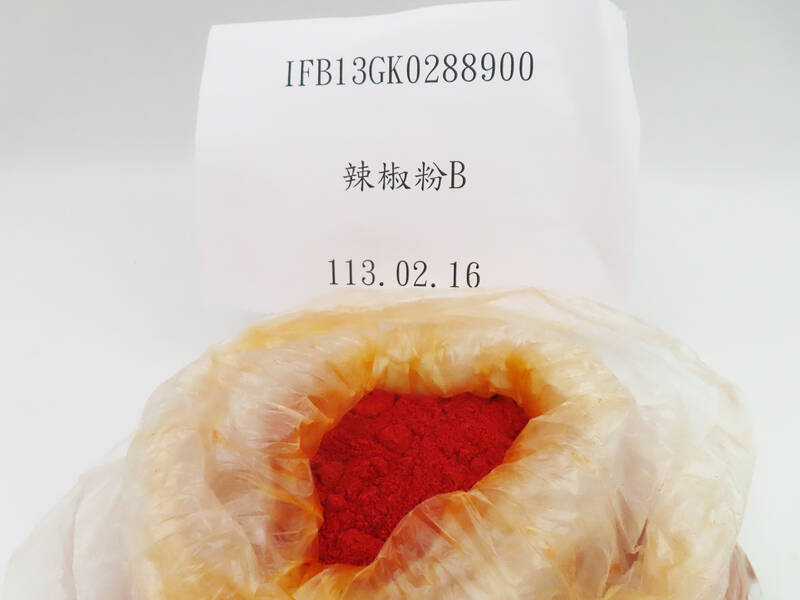Ten tonnes of chili powder imported from China have been found to contain industrial Sudan red dyes and would be destroyed, the Food and Drug Administration (FDA) said yesterday.
Sudan reds are industrial dyes normally used for coloring plastics and other synthetic materials. They are classified by the International Agency for Research on Cancer (IARC) as Group 3 indirect carcinogens and are banned in food many countries, including Taiwan.
Batches of imported chili powder have been found to contain Sudan reds since January, leading to expanded inspections and the removal of food products that used the tainted products.

Photo courtesy of the Food and Drug Administration
The FDA in December last year increased border inspection frequency for chili powder imported from China to batch-by-batch.
On March 13, it announced stricter measures, including that it would destroy food products found to contain Sudan reds upon discovery instead of returning them.
In yesterday’s announcement it said that two batches of chili powder — one of 7 tonnes and one of 3 tonnes — imported by the same company in Chiayi County were found to contain Sudan III.
FDA Deputy Director-General Lin Chin-fu (林金富) said the chili powder would be destroyed according to regulations and the manufacturer would be temporarily suspended from applying to import chili powder.
From Sept. 18 last year to Monday last week, 154 batches, totaling 1,052.74 tonnes, of chili powder from China had been tested at the border, with 26, or 16.9 percent, failing inspection for having Sudan III or excessive pesticide residues, FDA data showed.
It also said that 17 other items failed border inspections, including disposable cake plates and utensils, frozen chopped onions and green oatmeal extract from China; wood spatulas, cutting boards and soy sauce from South Korea; and chili sauce, chilled gray grouper and chilled rock fish from Indonesia.
Other items included dried Pacific saury and bamboo chopsticks from Japan; soup powder from Vietnam; frozen crabs from Thailand; grapes from India; oysters from the US; and grapes from Peru.
The chili sauce from Indonesia, labeled “Sambel Asli Cap Ibu Jari Jempol,” failed an inspection with sulfur dioxide residue of 0.08g/kg, exceeding the maximum limit of 0.03g/kg, the FDA said, adding that the product would be destroyed or returned.
Lin said that 613 batches of the chili sauce have been imported in the past six months, 22 of which have failed the inspection — a failure rate of 3.59 percent, so the inspection frequency of the chili sauce imported by the company has been increased to batch-by-batch.
Additional reporting by CNA

Chinese Nationalist Party (KMT) Chairman Eric Chu (朱立倫), spokeswoman Yang Chih-yu (楊智伃) and Legislator Hsieh Lung-chieh (謝龍介) would be summoned by police for questioning for leading an illegal assembly on Thursday evening last week, Minister of the Interior Liu Shyh-fang (劉世芳) said today. The three KMT officials led an assembly outside the Taipei City Prosecutors’ Office, a restricted area where public assembly is not allowed, protesting the questioning of several KMT staff and searches of KMT headquarters and offices in a recall petition forgery case. Chu, Yang and Hsieh are all suspected of contravening the Assembly and Parade Act (集會遊行法) by holding

PRAISE: Japanese visitor Takashi Kubota said the Taiwanese temple architecture images showcased in the AI Art Gallery were the most impressive displays he saw Taiwan does not have an official pavilion at the World Expo in Osaka, Japan, because of its diplomatic predicament, but the government-backed Tech World pavilion is drawing interest with its unique recreations of works by Taiwanese artists. The pavilion features an artificial intelligence (AI)-based art gallery showcasing works of famous Taiwanese artists from the Japanese colonial period using innovative technologies. Among its main simulated displays are Eastern gouache paintings by Chen Chin (陳進), Lin Yu-shan (林玉山) and Kuo Hsueh-hu (郭雪湖), who were the three young Taiwanese painters selected for the East Asian Painting exhibition in 1927. Gouache is a water-based

Taiwan would welcome the return of Honduras as a diplomatic ally if its next president decides to make such a move, Minister of Foreign Affairs Lin Chia-lung (林佳龍) said yesterday. “Of course, we would welcome Honduras if they want to restore diplomatic ties with Taiwan after their elections,” Lin said at a meeting of the legislature’s Foreign Affairs and National Defense Committee, when asked to comment on statements made by two of the three Honduran presidential candidates during the presidential campaign in the Central American country. Taiwan is paying close attention to the region as a whole in the wake of a

OFF-TARGET: More than 30,000 participants were expected to take part in the Games next month, but only 6,550 foreign and 19,400 Taiwanese athletes have registered Taipei city councilors yesterday blasted the organizers of next month’s World Masters Games over sudden timetable and venue changes, which they said have caused thousands of participants to back out of the international sporting event, among other organizational issues. They also cited visa delays and political interference by China as reasons many foreign athletes are requesting refunds for the event, to be held from May 17 to 30. Jointly organized by the Taipei and New Taipei City governments, the games have been rocked by numerous controversies since preparations began in 2020. Taipei City Councilor Lin Yen-feng (林延鳳) said yesterday that new measures by